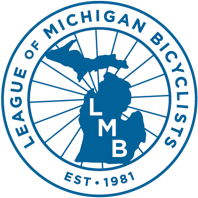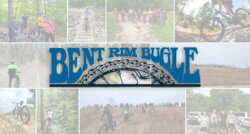
In this issue:
- Introduction
- MMBA Presents: Fundamental Mountain Bike Skills Clinics
- From Transplant to Triumph: Camille Frede’s Inspiring Journey to the Iceman Cometh Challenge (Gina Apone)
- North Country National Scenic Trail Officially Deemed a National Park (Gina Apone)
- Childhood Independent Mobility: Who’s on the Move? (Cody Sovis)
- Introducing Toddler Adventure Cycling (Jessica Holton)
- Welcome to New LMB Club Member: TOMMBA
- Throwback to Winter 1989
- LMB Rings in 2024… (LMB Staff)
Welcome to the latest issue of the timeless Bent Rim Bugle (BRB), official newsletter of the Michigan Mountain Bike Alliance (MMBA)! Think shared information, stories, and advice on all things MTB and gravel from fellow members of the community.
This bi-monthly digital publication will act as a channel for members of the community to connect and will be fun, useful stuff from bicyclists for bicyclists. We want to hear from YOU. If it’s about biking, we hope you’ll send it in for future issues! We’re currently accepting submissions on a rolling basis. Please submit to [email protected].
The original Bent Rim Bugle became the official newsletter of the MMBA’a mountain biking and gravel riding community with the formation of the organization. Now, we bring back the BRB name not only as a nod to the newsletter that pioneered a means for organizing the state’s off-road cyclists to work for continued access, but as a channel for members of the community to connect.
We’ve also started up a similar publication for LMB’s on-road community, Michigan Bicyclist Mini. Both of these community newsletters aim to provide a platform for ALL bicyclists to share with and inform one another on all things biking.
MMBA Presents: Fundamental Mountain Bike Skills Clinics

Are you new to mountain biking? Do you want to improve your riding and handling skills?
Join the Michigan Mountain Bike Alliance (MMBA) – Part of the League of Michigan Bicyclists (MMBA – LMB) for a new series of Fundamental MTB Skills Clinics!
Check out the full 2024 clinic schedule:
- April 28 – Southeast Michigan Clinic (tentative: Settlers Park, Hartland Twp.)
- May 19 – Mid-Michigan Women’s Clinic (Burchfield Park, Holt)
- May 26 – Upper Peninsula Clinic (Location TBD)
- June 2 – West Michigan Clinic (tentative: The Dragon Trail, White Cloud)
- July 14 – Southwest Michigan Clinic (tentative: Fort Custer Recreation Area, Augusta)
These clinics will provide riders with fundamental skills needed to confidently ride natural surface single track trails in Michigan and beyond. Our certified coaches will explain and demonstrate the foundational skills, provide riders with individual feedback, as well as advanced progressions of these skills. Some of the skills covered will include but are not limited to:
- Neutral and Ready Positions
- Bike/Body Separation
- Braking and Shifting
- Ratcheting
- Riding Straight Lines
- Switchbacks
- Climbing – Climbing Positions, Restarting on a Climb, Climbing Dismount
- Descending – Descending Dismount, Braking on Descents
- Roll down
- Front and Rear Wheel Lifts
Join us for our first confirmed women’s skills clinic on May 19th, 2024, at Burchfield Park at 8:00 am. This clinic welcomes all women including trans, femme, and non-binary participants. Clinic cost $225 per rider. Registration also includes light breakfast and lunch. (Limited to 20 participants. Depending on clinic interest, more spots may be made available.)
Learn more and register for the Women’s Clinic
Registrants of ALL clinics will be automatically entered into a drawing for a brand new set of wheels. Big thanks to our friends at Velocity USA your support!
From Transplant to Triumph: Camille Frede’s Inspiring Journey to the Iceman Cometh Challenge
Written by Gina Apone
There was a time that Grand Rapids native, Camille Frede would never have imagined that she would be able to ride a bike without great struggle, let alone race in a 30-mile mountain biking event. In November, she did just that when she participated in the 2023 Iceman Cometh Challenge five years after her lung-heart transplant.
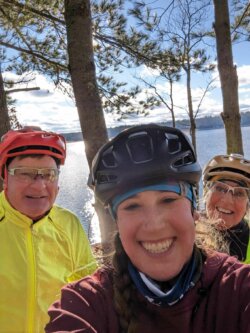
Camille (center) rides the Dragon Trail in Newaygo County with her parents Eric (left) and Nancy (right) Frede.
Camille was diagnosed with pulmonary hypertension when she was just four years old. At the time, doctors told her parents that she had only three years to live. Pulmonary hypertension is a lung disease in which the blood vessels connected to the lungs get obstructed, causing lung and heart damage. “Back then, it was kind of a death sentence.” Camille shared in 9&10 News article, “Michigan Native preps for the Iceman Challenge 5 years post lung-heart transplant” by Rachel Rademacher.
Despite it being a new and rare diagnosis at the time, Camille and her parents were able to find doctors and treatments to ultimately help her beat her diagnosis and live well beyond what doctors had predicted.
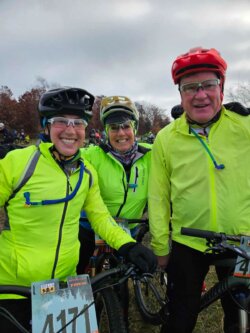
Camille (left) at Iceman Cometh with her parents Nancy (center) and Eric (right) Frede.
While Camille survived her initial diagnosis, her health remained a serious obstacle throughout her childhood and had her in and out of hospitals. Day to day activities like climbing the stairs, putting on her shoes, or taking short walks were a struggle. Things finally changed in February 2018 when Camille had her transplant surgery in Boston where she had moved to prep and be near her medical care.
Although the road to recovery was long, Camille was up to the challenge. She was released just two weeks after her transplant surgery and from there on out, she worked relentlessly to grow stronger. Camille began to do things she had struggled with before her transplant, like going bicycling with her parents. In the previously mentioned article, she shared “A heart-lung transplant enabled me to do riding and biking and hiking and all the different activities and even go to school. So it was a life changing surgery.”
In March 2023, Camille hit her five year mark since the transplant surgery, a huge milestone in her path to recovery. She explained, “when you meet your five year mark in transplant, it means that, well, one, I haven’t had any rejection at all.”
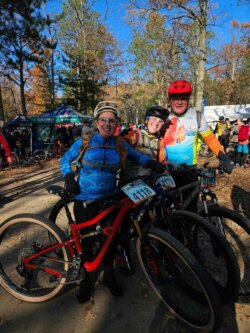
Camille (center) at Iceman Cometh with her parents Nancy (left) and Eric (right) Frede.
Pulmonary hypertension kept Camille from living the active lifestyle she had wanted for years. To celebrate the fact that her disease would no longer be holding her back, she participated in the 34th annual Bell’s Iceman Cometh Challenge in Traverse City. Every November, over 5,000 riders from across the country and around the world assemble for the largest single day, point-to-point mountain bike race in the country.
“I grew up watching my dad race and my mom mountain biking. And even when I was sick, I would bike,” Camille shared her connection to biking. “And so, I think that drive comes from a lot of growing up with that mentality of exercise and, you know, that stuff. But also, it’s good for the lungs and heart to exercise. So, it, I think, has been a really big factor in keeping rejection away.”
Now, Camille not only thrives but inspires, proving that every day post-transplant is an opportunity to greet life with courage and resilience.
Learn more about becoming a donor here.
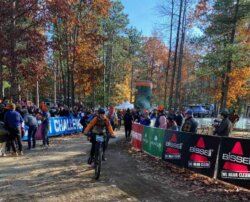
Camille riding to the finish at Iceman Cometh.
North Country National Scenic Trail Officially Deemed a National Park
Written by Gina Apone
In early December 2023, the National Park System recognized the North Country National Scenic Trail (NCNST) as a National Park along with The Ice Age and New England scenic trails. Crawling 4,800 miles from North Dakota all the way to Vermont, the North Country Trail is the longest of the 11 National Scenic Trails in the country. Spanning parts of Michigan, Minnesota, North Dakota, New York, Ohio, Pennsylvania, Vermont, and Wisconsin, it highlights a variety of landscapes including areas of the Manistee National Forest and Lake Superior shoreline.
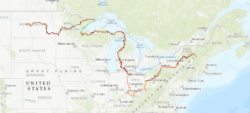
The North Country Trail was previously administered by the National Park Service as part of the National Trails System, but is now also recognized as a unit or “park” of the National Park System. Before the North Country Trail was recognized, the Appalachian Trail, Natchez Trace Trail, and Potomac Heritage Trail were the only three of these trails to have been granted unit status.
In this case, unit status means that North Country Trail will now receive additional resources and funding opportunities as well as be promoted to the public, something trail supporters had been wanted for decades.
“The stewards of these three trails have called for equality for 30 years, so we’re thrilled by Director Sams’ decision,” said Andrea Ketchmark, Executive Director of the North Country Trail Association. “This is such a win for us, our partners, and our volunteers, who work so hard to build, maintain, and protect the trail.”
In a post earlier this month, the North Country Trail Association Facebook page addressed concerns over what this new status entails for trail users and shared:
“Since this news broke, we’ve received a lot of questions about what this means for you as a trail user. Long story short: Unit status does not change how you access the trail or how our partners manage it.”
For additional details, visit North Country Trail’s Q&A Blog Post.
Childhood Independent Mobility: Who’s On the Move?
Submitted by Cody Sovis
The opportunity for kids to move freely and confidently has changed over the past several decades. Since the 1970s, the number of children who walk to school alone or with friends has declined from 80% to just 9%. This has had a real impact on levels of physical activity, mental health, and more.
Why Bike Independence Matters
Independent mobility on foot or two wheels is more than just getting around. Habits and skills learned early in life have long-lasting effects well into adulthood. Researchers found that car ownership rates, cultural and socioeconomic backgrounds, and neighborhood safety perceptions heavily impact children’s independent mobility. Many risks associated with alternative and independent forms of transportation are exaggerated; research shows that, at least in Canada, kids are just as likely to be injured in a car accident as they are when walking or cycling.
The Physical Benefits of Kids on Bikes
Riding to school, sports practices, and other activities help children get the recommended 60 minutes of physical activity per day. Studies show only about 7% of children meet the one-hour-per-day quota per week – most average 60 minutes per week in total. Studies show a close positive correlation between regular physical activity and lower rates of depression, anxiety, cardiovascular disease, and other health risks.
Who Rides, Who Walks, and Who Gets Left Behind
Self-reported studies show that gender, age, and phone ownership (a reflection of income level) are positively associated with independent mobility. That is to say that boys in 4th grade or higher were more likely to walk or ride to school than a girl in a similar circumstance.
- Parents set the tone. For both genders, children were more likely to get to school independently if their parents drove themselves to work. Girls whose parents traveled by bike are more likely to ride to school; interestingly, this correlation was not statistically significant in boys.
- Gender matters. Even at the same ages, girls were less likely to ride or bike to school than boys. Gender inequality was more pronounced in communities with poor pedestrian and cycling infrastructure and higher perceived risk of crime.
- Mobile phones. Children with daily access to mobile phones were more likely to ride or walk to school. This is likely due to an increased perception of safety, with parents being able to contact or monitor their children en route. As expected, mobile phone ownership rates decline alongside household income, likely contributing to lower independent mobility rates in socioeconomically challenged communities.
The Solution Is Clear. That Doesn’t Mean It’s Easy.
Studies like these confirm many similar research findings consistently show the value of creating safe, bike and pedestrian infrastructure. These efforts are most impactful in communities with lower average income levels or elevated crime rates.
There are some non-modifiable variables, such as child age and location. Specifically, as the distance between home and school increases, independent mobility declines as a matter of course. Geographical challenges in many rural communities may require additional investment in alternative public transportation, such as more public busing subsidies or adjusted school arrival and dismissal times.
Healthy Habits Start Early
In-school and after-school bike programs can play a role in educating and empowering independent mobility in age-appropriate populations. From bike buses to marked bike routes, communities and neighborhoods should invest in independent mobility while encouraging parents to take a more active role in teaching their kids to ride safely in urban environments. Norte Youth Cycling is committed to inspiring healthy, active kids on two wheels; learn more about their work.
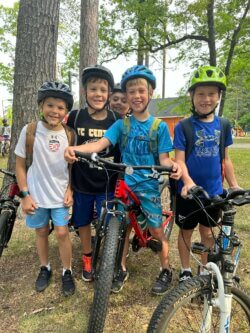
Cody Sovis has been racing and riding since he was three years old and enjoys early mornings on Old Mission Peninsula. Learn more at norteyouthcycling.org.
Introducing Toddler Adventure Cycling
Submitted by Jessica Holton
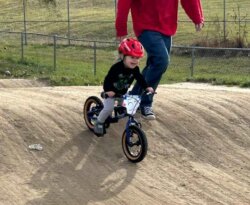
The Toddler Adventure Cycling group was started to give 2-4-year-old toddlers a group to ride with in the Lansing area. My son recently transitioned to a pedal bike and I realized all the groups for children are geared towards older kids. After deciding that toddlers deserve a group to ride with, Toddler Adventure Cycling was born. The plan is to do a monthly meet up starting in the spring where the toddlers will be given ample opportunity to ride both paved and dirt trails.
Welcome to LMB’s Newest Club Member
Special thanks and warm welcome to our newest member, Top Of Michigan Mountain Bike Association (TOMMBA). Glad to have you!

TOMMBA is a non-profit educational association whose mission is to create, enhance and preserve exceptional mountain bike trails and riding experiences for mountain bikers. TOMMBA serves Charlevoix and Emmet Counties, which includes the cities of Boyne City, Charlevoix, East Jordan, Harbor Springs and Petoskey. TOMMBA is dedicated to creating, enhancing and preserving great trail experiences for riders of all levels. 100% of your dues go to developing and maintaining sustainable mountain bike trails. Visit their website to learn more.
LMB Rings in 2024…
As we say goodbye to 2023, we want to start the new year in the right gear! LMB staff took a moment to share some intentional goals for 2024:
Neal Glazebrook, Events Director
“To get to ride on each LMB event one day with our riders and supporters!”
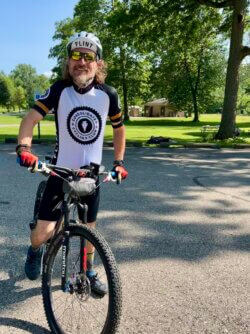
Jessica Lanave, Outreach Coordinator
“Tandem ride the Genesee Wanderers Tuesday night Lennon ride with friends at least twice a month and ride the Assenmacher 100 route twice (at least the 100k). As the A-100 Ride Coordinator, I don’t ride the day of. Explore more of Michigan on the tandem, with Jim.”
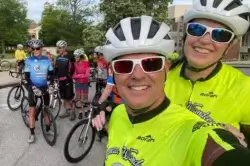
Throwback to Winter 1989
The original Bent Rim Bugle became the official newsletter of the MMBA’a mountain biking and gravel riding community with the formation of the organization. Now, we bring back the BRB name not only as a nod to the newsletter that pioneered a means for organizing the state’s off-road cyclists to work for continued access, but as a channel for members of the community to connect. This publication has transformed in many ways over the years, but has remained committed to carrying the torch to connect the off-road community.
Take a look at this Winter 1989 issue to see the publication then v. now and how it’s come along since then!
Categorised in: Bent Rim Bugle, Uncategorized
